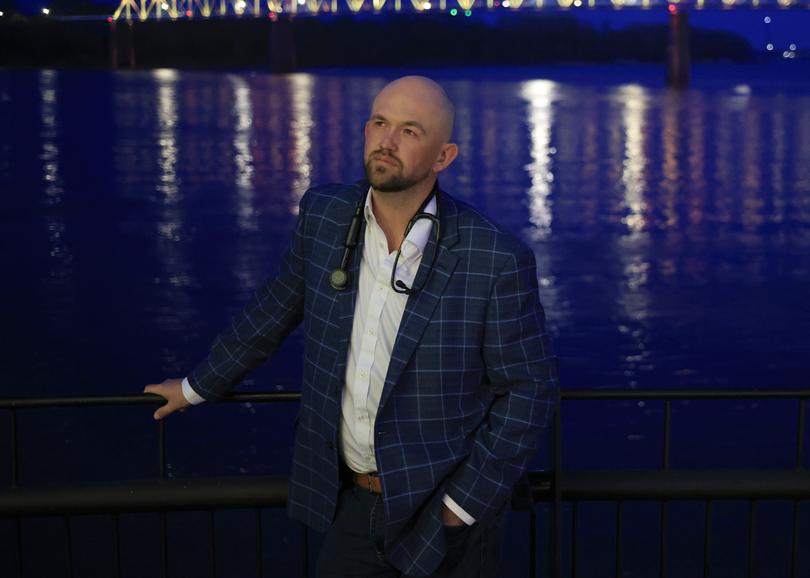The New York Times: Is the era of ‘Brozempic’ upon us?
Fella Health, which prescribes weight-loss drugs to men, sometimes deploys a bro-y tone to appeal to its target demographic.

A grinning golfer with a modest belly, admiring a drive. A silver fox in a suit jacket, enjoying a glass of wine as a beautiful woman gazes into his eyes. A bearded father, cooking for his children in a sun-dappled kitchen.
These are the models of well-being promoted by Fella Health, a startup that prescribes buzzy weight-loss drugs to men.
With a pitch long on pop science and boldfaced statistics, and short on appeals to looks, Fella tries to answer the question: How do you sell GLP-1s — the revolutionary class of drugs like Ozempic that are frequently used for weight loss — to the people less likely to take them?
Sign up to The Nightly's newsletters.
Get the first look at the digital newspaper, curated daily stories and breaking headlines delivered to your inbox.
By continuing you agree to our Terms and Privacy Policy.One tip: Don’t be afraid of a little bro talk. (“Tired of not hitting your weight goals, big guy?” Fella asks in one of its Instagram ads.)
“We’re not mommying you,” said Richie Cartwright, the founder of Fella. “We’re a mechanic. You’re bringing a car in that needs to get fixed.”
This branding — unemotional, a bit gruff, just-the-facts-Jack — is far from typical when it comes to talking about weight loss, a sensitive issue for many. And yet a crop of companies seem to believe that marketing the drugs to men, particularly middle-aged men, may require a slightly different, more stereotypically masculine approach.
The homepage for Blokes, another telehealth company, is full of stark black-and-white images of shirtless weightlifters; and Ro, formerly Roman, released an ad intended to reach men interested in GLP-1s. Those brands are in the mould of others, like Hims and Keeps, which have found financial success by discreetly selling medication to treat sensitive conditions like balding and erectile dysfunction. Though men are hardly immune to vanity, these companies try to sidestep it.
“If you make it too much about appearance, a lot of men are like, I’m not that, I’m a practical man,” said Cartwright, who estimated that he had spoken with more than 1,000 men about their attitudes toward weight loss.
He said his company has attracted almost 10,000 “fellas” since it was started in 2021. It has a goal of reaching 1 million by 2026.
That’s a drop in the bucket of Americans using GLP-1s for weight loss. Ozempic was approved in 2017 for diabetes treatment but became a household name last year as a weight-loss drug. As its popularity skyrocketed, some telehealth platforms began selling unauthorized alternatives. Fella says it prescribes semaglutide — the active ingredient in Ozempic — from compounding pharmacies.
Compounded semaglutide is not approved by the FDA, and the agency has warned that such products may not be safe or effective.
Though there isn’t good data about how many people are taking GLP-1s, nor about the gender breakdown of those who do, a poll last year by KFF, formerly the Kaiser Family Foundation, found that 51% of American women were interested in taking such drugs, compared with 38% of men. And a 2020 study found that men in Britain were often put off from using weight-loss services because they felt outnumbered by women, or because the focus on praise and discussion of feelings was overbearing.
Adrienne Bitar, a lecturer in American Studies at Cornell University and the author of “Diet and the Disease of Civilization,” said that in pop culture, Ozempic has been closely associated with female celebrities thought to be obsessed with their looks.
The approach taken by companies like Fella to branding the drugs is “trying to legitimize that yes, you can be a man, and yes you can lose weight,” Bitar said. “But it doesn’t have to be this frivolous, fad-diet vanity project that women’s weight loss has been cast as for 150 years.”
Chace Franks, a nurse practitioner from Owensboro, Kentucky, posts about a wide variety of topics related to GLP-1s on TikTok, including his own experience taking semaglutide. Franks, who has 116,000 followers on the app, specializes in weight management and began writing scripts for GLP-1s in a local clinic. He now works full-time as a provider for a telehealth company that prescribes compounded semaglutide.

He said a vast majority of his telehealth clients were women. In his personal life, many of his male friends are “intrigued” by his experience taking semaglutide, he said, but negative cultural messages around using drugs to lose weight can give men second thoughts.
“Men are slower to ask for help,” Franks, 35, said. “There’s some shame in the society and media about taking medication for weight management. The comments I get about taking ‘the easy way out’ — most of those come from men.”
Although both men and women report dissatisfaction with their bodies, women face greater bias for being overweight than men. And the very idea of losing weight outside the confines of sports or exercise is itself gendered, according to Emily Contois, an associate professor of media studies at the University of Tulsa.
“Weight loss has been understood as feminine and feminizing, not just in the U.S. but in similar Western countries,” said Contois, who is also the author of “Diners, Dudes, and Diets: How Gender and Power Collide in Food Media and Culture.”
That makes some men feel uncomfortable even admitting they take a GLP-1.
Keith Berry, the owner of a renovation and cabinet company in Kelowna, British Columbia, said that at first, he was hesitant to share that he had started Ozempic.
“It felt weird to be like, ‘I’m on a weight-loss medication,’” Berry, 45, said. “I’m a 40-year-old man who’s happily married and has kids and a job and everything else. I’m not a TikTok model.”
Ro, the telehealth company, produced three ads last year with patients to promote GLP-1s. Two of the ads star women, who describe being overwhelmed with thoughts of food and tout the “mental freedom” the drugs have given them to enjoy family vacations and nights out with friends. The third ad features a patient named Josh, shown as a young man in a football uniform and military dress, who is unable to resist doughnuts. The drugs, he says, have allowed him to scuba dive — to resume an active lifestyle.
“GLP-1s are like a military mindset in a shot,” he says.
Though women are more commonly the targets of diet culture, when men are the focus it’s usually to play up the stresses of being male in the modern world. According to Bitar, men’s diet programs ramped up around the time of President Dwight D. Eisenhower’s heart attack in 1955 and focused on cholesterol and the cardiac health of high-powered men.
Decades later, the meat-heavy “keto” and Paleo diets that became popular among men in the 2010s were about “reclaiming a lost masculinity that had been flabbed over by society,” she said. In 2012, WeightWatchers introduced a “Lose Like a Man” ad campaign fronted by basketball star Charles Barkley.
Occasionally, men availing themselves of the latest weight-loss regimens publicly acknowledge concern for their looks. A poster child for a busy man who takes a GLP-1 is Elon Musk, who said in 2022 that he had started Wegovy after photos of him shirtless on vacation provided what he called “helpful motivation to lose weight.”
At a recent event, Musk, the CEO of Tesla and SpaceX, told The New York Times that he still “occasionally” takes Wegovy, but that prospective users should be prepared to “burp and fart,” a reference to two common side effects.
Other high-profile men who have discussed their experiences with the drugs include Barkley, who said a GLP-1 drug made him feel like “like a human being”; film director Paul Schrader, who wrote on Facebook that he experienced unwanted side effects; and comic actor Tracy Morgan, who joked that he had “outeaten” the drug, but later clarified that it worked for him. Michael Rubin, the CEO of the online sports merchandise retailer Fanatics, dressed up as a Mounjaro injection for Halloween.
Ultimately, said Jake Beaven-Parshall, a plus-size influencer who was paid by Weight Watchers to promote its GLP-1 offerings, the gender of the person taking a weight-loss drug shouldn’t matter.
“It’s ridiculous to try to feminize your health, or gender your health care,” he said. “You need to do what’s best for you.”
This article originally appeared in The New York Times.
© 2024 The New York Times Company
Originally published on The New York Times
